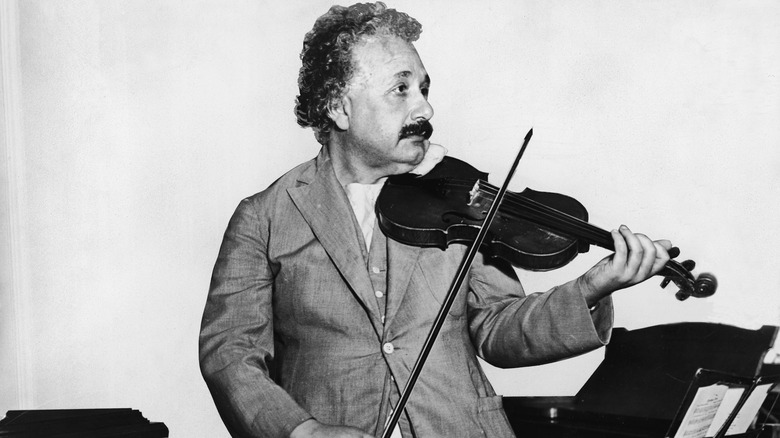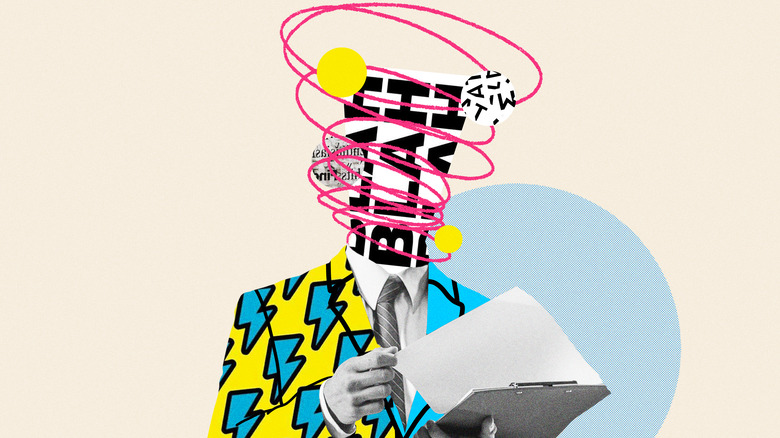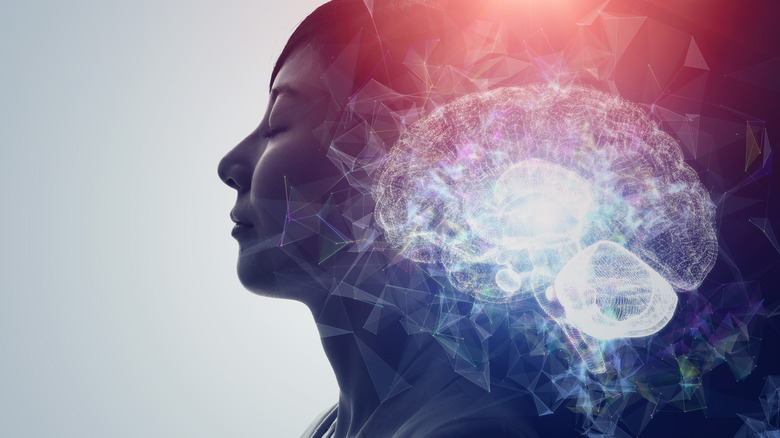What Science Says It Takes To Be A Genius
"Talent hits a target no one else can hit. Genius hits a target no one else can see." This quote from 19th-century German philosopher Arthur Schopenhauer (via CBS News) bundles up almost all of the difficulties we have defining "genius." Genius is often regarded as some magical, inscrutable power impossible to comprehend, like "creativity." Folks who channel this power, such as oft-cited geniuses like Leonardo Da Vinci, are often shrouded in mystique and myth, if not downright revered as evidence of humanity's brilliance and worth.
Some people define a genius as nothing more than a "super smart person." But is that all there is to it? Can genius be captured by a simple metric like an IQ test? Or can researchers define genius based on folds in the brain? More pointedly, should genius be defined by what it is, or what it does? If someone sits in a chair all day thinking of brilliant ideas that are never spoken or acted on, is that person a genius?
Genius also requires vehicles of expression. We often colloquially say that someone like Paul McCartney or David Bowie is "a musical genius," for example. Does that mean Bowie could have done math with Einstein? How about Johan Vaaler, the dude who invented the paper clip in 1899 (via ThoughtCo.)? He's certainly had an impact on a lot of lives. Not genius enough? How about the person who created the rocket? Envisioned the first wheel? And yet, amid so many difficult questions, scientists do have some specific answers.
The anatomy of a genius
Out of the two main scientific disciplines we can tap to describe genius, neurology and psychology, it might be helpful to look to the hard science first: neurology. And when thinking of all the ways of expressing genius, it's helpful to key in on one person whose brilliance no one can dispute: Albert Einstein. Einstein was the central figure in an early 20th century physics revolution, and formulated special relativity in 1905 (space and time are one continuum relative to an observer, via Space) and general relativity in 1915 (mass distorts space-time, also via Space). Pretty genius dude? You bet.
When Einstein died in 1955, his brain was extracted and examined to try and identify what made him so special. First off, Einstein did not have a larger brain than average. NY Neurology Associates confirms that there's no correlation between brain size and intelligence. However, as SciTech Connect explains, Einstein did have more folds (gyri) on his cerebrum, the squishy gray part of the brain associated with higher functioning, particularly the right frontal lobe connected to consciousness, attention, memory, and so forth. His corpus callosum, the bundle of nerves connecting both halves of the brain, was also thicker, meaning that both hemispheres communicated more often, and operated in a synchronized, holistic way. Finally, Einstein had more glial cells than average. These cells supply the brain with nutrients. While those factors alone can't account for genius, they do tell us that intelligence, inventiveness, creativity, and the like have an anatomical basis.
The creativity component
Einstein also exhibited a characteristic shared by anyone we would define as genius, across any domain: creativity. Did Einstein come to comprehend that the speed of light was the same for all observers because he was really good at repeating rote mathematics in his high school classroom? Certainly not. (He actually realized it while riding a bicycle toward a street light, per SciTech Connect.)
Creativity is another concept that, like genius, seems ill-defined, but really isn't. On Scientific American, Dr. Anna Abraham says that creativity must not only reflect "our capacity to generate ideas that are original, unusual or novel in some way," but must also be "satisfying, appropriate or suited to the context in question." Take Leonardo Da Vinci, for example, the well-known Italian Renaissance polymath and artist. He exhibited relentless curiosity, lateral thinking, and hypothetical reasoning while doing things like drawing the Vitruvian Man, painting the Mona Lisa, and dreaming of flight (explained on Psychological Science). But his work wasn't just a bunch of random, useless ideas; it was pointed and constructive.
Roger Beaty, postdoctoral fellow in cognitive neuroscience at Harvard University, studied this connection further in a 2018 study published in Proceedings of the National Academy of Sciences of the United States of America — PNAS. Those with higher creativity, he found, had stronger connections between three neural networks: default (where day-dreaming occurs), executive control (focused concentration), and salience (the switch between the two). Creativity's neurological underpinnings, it seems, help mold genius.
The intelligence connection
It makes sense that we associate genius with intelligence. After all, it seems unlikely that folks like Aristotle (4th century BCE Greek philosopher), Frederick Chopin (composer of complex piano pieces) or Louis Pasteur (chemist who unraveled the process of pasteurization) were less-than-sharp individuals. But have a look at those three fields: philosophy, music, and biochemistry. Genius can take many forms, and be associated with many different kinds of intelligences. It needn't relate directly to IQ, i.e., "intelligence quotient."
Whether or not people realize it, when they talk about IQ they're likely referring to the Stanford-Binet Intelligence Scale developed back in 1916, as Science Direct describes. This scale produces a numerical value like "100" for a squarely average intelligence. But if it's reductionist to even rate something like a film according to a score of 7 out of 10, how could the complexities of human intellect be reduced to a single number?
More and more, researchers like Dr. Howard Gardner, Professor of Cognition and Education at the Harvard Graduate School of Education, describe multiple kinds of intelligence across different domains. His 1983 book "Frames of Mind: The Theory of Multiple Intelligences" discusses seven types of intelligences, later expanded to eight, as CNBC explains: spatial intelligence (understanding space and patterns), bodily-kinesthetic intelligence (physical coordination and awareness of the body), musical intelligence, linguistic intelligence, logical-mathematical intelligence, interpersonal intelligence (understanding others), intrapersonal intelligence (understanding oneself), and naturalistic intelligence (zoologists, botanists, etc.) Genius can flourish in any of these domains.
Debunking the lone genius myth
Let's move away from the neurological and psychological facets of genius to the kind of sociohistorical factors discussed in the Journal of Humanistic Psychology on Research Gate. Simply asked, does genius exist in a bubble? Can a genius just sort of pop up somewhere outside of social, cultural, and historical context? Put differently, could an anatomically identical Einstein born in 3500 BCE, with the same intellectual potential and inclinations, but without the scientific scaffolding that led to the early 20th century, have produced the same work? The answer is obviously no.
Then there's the issue of community support, access to certain resources, and a stable-enough environment. Take William Kamkwamba, who built a wind-powered generator out of spare parts around his village in Malawi in 2001 (via Interesting Engineering), or Kelvin Doe, who reverse engineers radio transmitters and batteries from discarded circuits and trash (via THINKR on YouTube). Both young men grew up in electricity-deprived environments that drove their actions, and neither had their inclinations inhibited by their environment. This is what genius requires to exist, let alone thrive.
In their study in the Journal of Humanistic Psychology, researchers Alfonso Montouri and Ronald E. Purser go one step further to describe how "genius" changes according to the time. For instance, maybe the person who created the potter's wheel blew everyone's minds 7,500 years ago (via ThoughtCo.), but nowadays, all things being equal, would struggle to get a B in an Introductory Psychology course.
Motivation and process
We've alluded to the final part of what goes into making a genius, but now we'll call it out directly: motivation and process. Einstein, Da Vinci, Chopin, Aristotle, Kelvin Doe, or anyone else, could have been born with all the neurological, psychological, and environment strengths and support in the world. But if they didn't actually do something about it, all their potential would have been squandered.
As Paul Thiebaut writes on Medium, Einstein was relentlessly driven to learn about what he loved: physics. His father gave him his first compass at age 5, and he would skip school to study physics and devise his own algebraic formulae at home. Even though he despised the repetitiveness of the classroom, he tried to finish high school by age 16 simply so he could go to university and continue studying physics. He was single-minded to the point of obsessed when doing what he loved. When doing what he didn't love he was equally disinterested.
On this point, CBS News cites Scientific American in describing how geniuses of all stripes conform to the same "general process" regarding their inquiries, learning, and societal contributions. They tend to ask open-ended questions rather than seek specific answers, and embark on a trial-and-error methodology to learn about their favored subject. We can all take heart from this, because in the end, motivation and process are the facets of genius that any of us can control in our personal lives.





